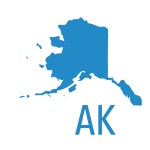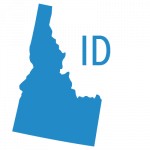Real estate license reciprocity allows licensed agents and brokers to obtain a license in a new state without completing all licensing requirements. Real estate portability enables out-of-state agents and brokers to undertake transactions within particular states. I researched each state’s real estate laws to provide a guide of the reciprocity and portability regulations for all 50 states and Washington, D.C., along with real estate license reciprocity chart examples to help real estate agents and brokers navigate their business throughout the country.
State-by-State License Reciprocity & Portability
To get started, pick your state from the drop-down list below to see the general reciprocity and portability rules. Then, continue reading to gain a complete understanding of what reciprocity and portability mean for your business and tips for conducting out-of-state transactions.
Alabama
Reciprocity: Selective Reciprocity
Portability: Cooperative State
All 50 states have real estate reciprocity agreements with Alabama. However, you must complete a 6-hour course in Alabama real estate law. You must also take and pass the corresponding Alabama portion of the licensure examination and submit an official “Certificate of Licensure” form (license history) proving that you possess a license in another state. It must be issued within 120 days of applying for a reciprocal license.
Link to Reciprocity Application: Alabama Reciprocal Application
Link to State Article: How to Become a Real Estate Agent in Alabama
Alaska
Reciprocity: Full Reciprocity|
Portability: Physical Location State
Alaska has reciprocity, commonly known as “by endorsement,” with any other state if your license has been held for a year or more and you have completed a 6-hour Alaska real estate course and the Alaska state section of the real estate exam. You must also present proof of errors and omissions (E&O) insurance and a licensing history.
Link to Reciprocity Application: Real Estate Salesperson Application by Endorsement
Link to State Article: How to Become a Real Estate Agent in Alaska
Arizona
Reciprocity: Selective Reciprocity
Portability: Cooperative State (with limitations)
Arizona doesn’t have reciprocity agreements with any other state but recognizes out-of-state licensees. You have to complete a six-hour contract writing course, submit proof of legal presence and residency in Arizona, and education and license certificates. You must also provide a license history from the other state where your license has been held for at least one year, Arizona residency attestation, disciplinary actions disclosure form, and a fingerprint clearance card.
Link to Reciprocity Application: Out-of-State License Recognition Forms from the ADRE website
Link to State Article: How to Become a Real Estate Agent in Arizona
Arkansas
Reciprocity: Full Reciprocity
Portability: Physical Location State
Arkansas has reciprocity agreements with the following states: Alabama, Colorado, Florida, Georgia, Iowa, Kansas, Louisiana, Mississippi, Nebraska, Ohio, Oklahoma, Pennsylvania, South Dakota, Washington, and West Virginia. Suppose you are currently licensed in another state. In that case, you may request a waiver for the general portion of the exam, take and pass the Arkansas Law portion of the exam, and complete fingerprinting and background checks.
Link to Reciprocity Application: Reciprocal States and Application Requirements from the Arkansas Real Estate Commission website
Link to State Article: How to Become a Real Estate Agent in Arkansas
California
Reciprocity: No Reciprocity
Portability: Physical Location State
California does not give reciprocity with other states. To undertake real estate business in California, you must complete all requirements.
Link to Reciprocity Application: Out-of-State Application Information
Link to State Article: How to Become a Real Estate Agent in California
Colorado
Reciprocity: Full Reciprocity
Portability: Cooperative State (with limitations)
Colorado has reciprocity agreements with all 50 states. You don’t have to take the Department of Regulatory Agencies (DORA)’s prelicensing courses. Still, you must pass the Colorado portion of the real estate exam, complete a fingerprint background check, and provide a license history to earn your license. But, if you’ve been licensed for less than two years, you’ll need to complete the required 120 education hours and take the national and state portions of the exam.
Link to Reciprocity Application: Online application through DORA
Link to State Article: How to Become a Real Estate Agent in Colorado
Connecticut
Reciprocity: Selective Reciprocity
Portability: Cooperative State
Connecticut has reciprocity agreements with Alabama, Colorado, Florida, Georgia, Illinois, Indiana, Massachusetts, Mississippi, Nebraska, New York, Ohio, Oklahoma, and Rhode Island. In addition, all applicants will need to submit a copy of their license history and a completed, notarized application. However, all applicants from Florida, Illinois, Indiana, and Ohio, as well as those who have not passed a written examination in a reciprocal state, will be required to take the State Portion of the Connecticut Real Estate Examination administered by PSI.
Link to Reciprocity Application: Connecticut Reciprocal License Application or Apply Online
Link to State Article: How to Become a Real Estate Agent in Connecticut
Delaware
Reciprocity: Full Reciprocity
Portability: Physical Location State
Delaware has reciprocity with all 50 states. In addition to submitting your application and fees, you must submit your licensure history and the certificate of completion for education in another state (equivalent to 99-hours of education). Also, you should submit the original score report from Pearson VUE when you passed the general and Delaware law portions of the salesperson’s examination.
Link to Reciprocity Application: Apply online through Delaware Professional Regulation Online Service (DELPROS)
Link to State Article: How to Become a Real Estate Agent Delaware
Florida
Reciprocity: Selective Reciprocity
Portability: Physical Location State
The following states have reciprocity agreements with Florida: Alabama, Arkansas, Connecticut, Georgia, Illinois, Kentucky, Mississippi, Nebraska, Rhode Island, and West Virginia. To get a reciprocal real estate license in Florida, applicants must complete a background check and pass the Florida Real Estate exam, which consists of 40 questions.
Link to Reciprocity Application: Apply online or by using a printable application form
Link to State Article: How to Become a Real Estate Agent Florida
Georgia
Reciprocity: Full Reciprocity (except with Florida)
Portability: Cooperative State
Georgia has reciprocity agreements with all states. Applicants with active licenses in good standing must submit a background check and real estate license history. Florida licensees are the lone exception, as they must pass the Georgia real estate licensing exam.
Link to Reciprocity Application: Georgia Reciprocal Application
Link to State Article: How to Become a Real Estate Agent in Georgia
Hawaii
Reciprocity: No Reciprocity
Portability: Physical Location State
Hawaii doesn’t have reciprocity agreements with any other state. Still, you may apply and qualify for an Equivalency to the Prelicense Education Requirement and/or the Equivalency to the Uniform Examination.
Link to State Article: How to Become a Real Estate Agent in Hawaii
Idaho
Reciprocity: No Reciprocity
Portability: Physical Location State (with special circumstances)
Idaho has no reciprocity and other license agreements with any other states. However, Idaho waives the national portion of the licensing exam, prelicense education, and broker experience requirements (if applicable) if you are actively licensed in another state with the completion of the Request for Waiver Form. But you must complete a fingerprint background check and submit your errors and omissions (E&O) insurance and certified license history.
Link to Reciprocity Application: Idaho Real Estate License Requirements and Application Forms
Link to State Article: How to Become a Real Estate Agent in Idaho
Illinois
Reciprocity: Selective Reciprocity
Portability: Physical Location State
Illinois has reciprocity agreements with these nine states: Colorado, Connecticut, Florida, Georgia, Indiana, Iowa, Kentucky, Nebraska, and Wisconsin. Illinois doesn’t require additional coursework, but all applicants must take the Illinois State supplemental exam.
Link to Reciprocity Application: Apply online through the Illinois Department of Financial & Professional Regulation (IDFPR) Online Services Portal
Link to State Article: How to Become a Real Estate Agent in Illinois
Indiana
Reciprocity: No Reciprocity
Portability: Cooperative State
Indiana has no reciprocal agreements with other states. However, licensed agents can expedite the procedure on a case-by-case basis. For example, if you are currently licensed in another state, you can contact Indiana Real Estate Commission (IREC) at (1-800-457-8283) to see if they have reciprocity with your home state. In addition, if you are granted reciprocity, you will be allowed to sit for the state law section of the licensure examination.
Link to State Article: How to Become a Real Estate Agent in Indiana
Iowa
Reciprocity: Selective Reciprocity
Portability: Physical Location State (with special circumstances)
Iowa has reciprocity agreements with seven states: Arkansas, Georgia, Louisiana, Massachusetts, Minnesota, Mississippi, and North Dakota. Residents of these states must have had a license within the past six months, show a certificate of license history, proof of errors and omissions (E&O) insurance, and complete a state and national criminal history background check.
Link to Reciprocity Application: Apply through the Iowa Professional Licensing portal
Link to State Article: How to Become a Real Estate Agent in Iowa
Kansas
Reciprocity: No Reciprocity
Portability: Cooperative State
Kansas does not confirm reciprocity with other states. Still, suppose you have a real estate license in another state. In that case, you can apply to waive the national portion of the exam. You are only required to complete the Kansas-specific 30-hour prelicensing course and take the Kansas portion of the real estate exam by submitting a Client Exam Waiver to Pearson Vue.
Link to Reciprocity Application: For more information, check out the Salesperson Prelicensing Checklist and Nonresident Form.
Link to State Article: How to Become a Real Estate Agent in Kansas
Kentucky
Reciprocity: Selective Reciprocity
Portability: Turf State
Kentucky only offers reciprocal agreements with Florida, Illinois, Ohio, Tennessee, and West Virginia. To obtain a license through reciprocity in Kentucky, you must be actively licensed in the states mentioned above for one year. You must also complete a 40-hour reciprocal license law course, a national criminal history check, and take the reciprocal license exam. You should also provide proof of errors and omissions (E&O) insurance coverage, your license history, fees, and a background check.
Link to Reciprocity Application: For more information, check out the Kentucky Real Estate Commission
Link to State Article: How to Become a Real Estate Agent in Kentucky
Louisiana
Reciprocity: Selective Reciprocity
Portability: Cooperative State
Louisiana has a reciprocal license agreement with the following states: Alabama, Arkansas, Colorado, Georgia, Iowa, Mississippi, New Mexico, Oklahoma, and Pennsylvania. All applicants must complete a certified license history and background check and provide proof of errors and omissions (E&O) insurance.
Link to State Article: How to Become a Real Estate Agent in Louisiana
Maine
Reciprocity: Full Reciprocity
Portability: Physical Location State
Maine has reciprocity agreements with all 50 states. All applicants must pass the Maine law portion of the licensing exam administered by Pearson VUE and complete a background check. Also, they should provide a Furnish Verification of Licensure in good standing in their home state.
Link to Reciprocity Application: Apply online or by paper application
Link to State Article: How to Become a Real Estate Agent in Maine
Maryland
Reciprocity: Selective Reciprocity
Portability: Cooperative State
Maryland has reciprocity agreements with Oklahoma and Pennsylvania only. To qualify for a Maryland license under a reciprocal agreement, you must have an active license in good standing with one of these states. You must also submit a complete certified license history and a background check. However, applicants from all other states may apply for an Out-of-State License Recognition waiver.
Link to Reciprocity Application: Original Reciprocal Application
Link to State Article: How to Become a Real Estate Agent in Maryland
Massachusetts
Reciprocity: Selective Reciprocity
Portability: Physical Location State
Massachusetts has complete broker and salesperson reciprocity with the following states: Connecticut, Rhode Island, West Virginia, Nebraska, Iowa, Tennessee, Mississippi, Colorado, Georgia, Pennsylvania, and New Mexico. However, Massachusetts has limited broker and salesperson reciprocity with the following states:
- Maine: Brokers licensed for three years must apply for an Educational Waiver to bypass prelicensing education and complete the Massachusetts state portion of the exam
- New Hampshire: Agents must apply for an Educational Waiver to bypass prelicensing education and complete the Massachusetts state portion of the exam
- New York and Oklahoma: Complete reciprocity if licensed for two years
All other states must apply for an Education Waiver to waive prelicensing education requirements but are still required to take the entire (national and state) real estate exam.
Link to State Article: How to Become a Real Estate Agent in Massachusetts
Michigan
Reciprocity: No Reciprocity
Portability: Physical Location
Michigan doesn’t offer reciprocity agreements with any other state. All applicants for Michigan Real Estate Salesperson or Broker license must meet all education, experience, and examination requirements in place as of the date the application is submitted.
Link to State Article: How to Become a Real Estate Agent in Michigan
Minnesota
Reciprocity: Selective Reciprocity
Portability: Physical State (with special circumstances)
Minnesota has reciprocity agreements with six states: Colorado, Iowa, Nebraska, North Dakota, Oklahoma, and South Dakota. However, applicants in the states mentioned above must apply via the PULSE Portal and email a letter certifying their current license. Applicants from Wisconsin must complete a 13-hour reciprocal prelicense course and the state portion of the Minnesota exam.
Link to Reciprocity Application: For more information, check out Minnesota Elicensing
Link to State Article: How to Become a Real Estate Agent in Minnesota
Mississippi
Reciprocity: No Reciprocity
Portability: Cooperative State
Mississippi currently has no formal reciprocity agreements with other states. However, you may qualify if you have equivalent education and examinations from your current state. You can call the Mississippi Real Estate Commission at (601) 321-6970 for further inquiries.
Link to Reciprocity Application: For Salesperson: Non-Resident/Reciprocal Salesperson License Application; For Brokers: Non-Resident/Reciprocal Broker License Application
Link to State Article: How to Become a Real Estate Agent in Mississippi
Missouri
Reciprocity: Full Reciprocity
Portability: Turf State
Missouri offers full real estate license reciprocity with all 50 states. To earn their Missouri license, you are only required to complete the 24 hour-Missouri Real Estate Practice (MREP) course, pass the state portion of the real estate exam, and the criminal history background check.
Link to Reciprocity Application: Check out the Eligibility Requirements and Application Forms available on the MREC website
Link to State Article: How to Become a Real Estate Agent in Missouri
Montana
Reciprocity: Selective Reciprocity
Portability: Physical Location State
Montana doesn’t confirm reciprocity with other states. But Montana does allow out-of-state licensees to apply for reciprocity. According to the Real Estate Salesperson Checklist and Real Estate Broker Checklist, with a certificate of licensure from your current state, a passing score on the state portion of the Montana real estate exam, and proof of errors and omissions (E&O) insurance, you can be considered for reciprocal licensing.
Link to Reciprocity Application: Apply online or with the printable application
Link to State Article: How to Become a Real Estate Agent in Montana
Nebraska
Reciprocity: Selective Reciprocity
Portability: Turf State (with special circumstances)
Nebraska offers licenses “by recognition” rather than reciprocal licensing. This means that out-of-state agents in good standing may be issued an equivalent real estate license in Nebraska. As outlined on the Nebraska Real Estate Commission website, applicants must pass a Nebraska License Law Course, submit their license history, provide proof of errors and omissions (E&O) insurance, complete a background check, and submit an application and an Acknowledgement of Personal Jurisdiction.
Link to Reciprocity Application: Nevada Salesperson Application and Nevada Broker Application
Link to State Article: How to Become a Real Estate Agent in Nebraska
Nevada
Reciprocity: Selective Reciprocity
Portability: Cooperative State
Nevada has salesperson and broker license reciprocity agreements with the 16 states: Arizona, Delaware, Illinois, Iowa, Louisiana, Oklahoma, Texas, Washington, Colorado, Idaho, Indiana, Kentucky, Minnesota, South Carolina, Utah, and West Virginia. All applicants must submit the real estate license checklist and application (Form 549), proof of education and real estate license experience, and fingerprints. You must also pass the Nevada portion of the real estate exam, submit a certified license history, a notarized Consent to Service of Process (Form 656), and fee payments.
Link to Reciprocity Application: Nevada’s Real Estate Licensing Requirements
Link to State Article: How to Become a Real Estate Agent in Nevada
New Hampshire
Reciprocity: Full Reciprocity
Portability: Cooperative State
New Hampshire has full reciprocity with all states. To be eligible for New Hampshire reciprocity, you must be licensed in another state and have passed the entire licensing exam in that state (both National and State portions). Effective August 1st, 2022, New Hampshire recognizes all state real estate licenses for reciprocity.
Link to State Article: How to Become a Real Estate Agent in New Hampshire
New Jersey
Reciprocity: No Reciprocity
Portability: Turf State
New Jersey doesn’t have reciprocal agreements with any states. However, in certain circumstances, you can apply and submit an educational waiver to waive educational and examination requirements to obtain your New Jersey license. Contact the NJ Real Estate Commission’s Education Waiver Section at 609-292-7272 for further details.
Link to Reciprocity Application: New Jersey’s Real Estate Salesperson and Broker Licensing Requirements
Link to State Article: How to Become a Real Estate Agent in New Jersey
New Mexico
Reciprocity: Selective Reciprocity
Portability: Turf State
New Mexico has reciprocity agreements with three states: Georgia, Louisiana, and Massachusetts. The education and exam requirements are waived for residents of the following states. However, they are still required to submit their application, a copy of their license history, and proof of errors and omissions (E&O) insurance.
Link to Reciprocity Application: Prelicensing Education Waivers
Link to State Article: How to Become a Real Estate Agent in New Mexico
New York
Reciprocity: No Reciprocity
Portability: Physical Location State
New York has no reciprocity agreements with any states. But if you have completed a qualifying education outside of NY state, you can request a waiver for the course(s) required for NY state license. To request, you must submit a course description, proof of course completion, and a detailed outline listing the topics and hours completed.
Link to Reciprocity Application: Email dosedmailing@dos.ny.gov to request and document your waiver
Link to State Article: How to Become a Real Estate Agent in New York
North Carolina
Reciprocity: Selective Reciprocity
Portability: Cooperative State
Applicants who hold a current real estate license in another state that has been active for the last three years and is equivalent to NC’s provisional or full-broker license may be exempt from the 75-hour North Carolina broker prelicensing course and the North Carolina’s national section of the exam. Applicants can also choose to take the state section of the exam or waive it and obtain a provisional license instead (until they complete the post-licensing education requirements).
Link to Reciprocity Application: Apply online or read Real Estate Licensing in North Carolina for more detailed information
Link to State Article: How to Become a Real Estate Agent in North Carolina
North Dakota
Reciprocity: Selective Reciprocity
Portability: Cooperative State
North Dakota has reciprocity agreements with three states: Georgia, Iowa, and Minnesota. All applicants must hold a current license in good standing, pass the state section of the real estate exam, and complete a Consent to Suit form. You must also provide evidence of a Real Estate Trust Account (or an account waiver form) and a certified license history.
Link to Reciprocity Application: Check out North Dakota Real Estate Commission Forms to apply online and read the guidelines for reciprocity for more detailed information
Link to State Article: How to Become a Real Estate Agent in North Dakota
Ohio
Reciprocity: Selective Reciprocity
Portability: Cooperative State
Ohio has reciprocity agreements with the following eight states: Arkansas, Connecticut, Kentucky, Mississippi, Nebraska, Oklahoma, West Virginia, and Wyoming. Residents from these states must have their license for at least one year and take the Ohio Real Estate Law course. In addition, they must complete a background check, submit a Consent to Service of Process form, and prove affiliation with an Ohio-based broker. Link to Reciprocity Application: Limited Reciprocity Salesperson Application Form
Link to State Article: How to Become a Real Estate Agent in Ohio
Oklahoma
Reciprocity: Selective Reciprocity
Portability: Physical Location State
If you have two years or more of experience with a license from another state within the last five years, or if you have any amount of experience in the last five years from one of the following states: Alabama, Arkansas, Iowa, Louisiana, Maryland, Nebraska, North Dakota, or South Dakota, you may be eligible to take the Oklahoma State-only examination through PSI.
You must also complete at least one hour of continuing education in each of the three categories: Broker Relationship Act, Code and Regulations, and Contracts and Forms. In addition, you must submit a license certification history, and proof of citizenship, and pass a background check through IdentoGO.
Link to Reciprocity Application: Apply online and fill up Application Checklist
Link to State Article: How to Become a Real Estate Agent in Oklahoma
Oregon
Reciprocity: Selective Reciprocity
Portability: Cooperative State
Oregon has reciprocal licensing agreements with the following states: Alabama, Alberta, Georgia, Nebraska, and South Dakota. But, you must contact the Oregon Real Estate Commission directly at (503) 378-4170 for detailed information on the requirements.
Link to State Article: How to Become a Real Estate Agent in Oregon
Pennsylvania
Reciprocity: Selective Reciprocity
Portability: Turf State
The Pennsylvania Commission has reciprocity agreements with the following states: Arkansas, Georgia, Louisiana, Maryland, Massachusetts, and New York. However, residents in those states mentioned can only apply if they have an employing broker with a valid Pennsylvania real estate license. They will also be subjected to a background check in their current state and any state where they have lived and worked in the previous five years.
Link to Reciprocity Application: Apply online through the Pennsylvania Licensing System (PALS) Link to State Article: How to Become a Real Estate Agent in Pennsylvania
Rhode Island
Reciprocity: Selective Reciprocity
Portability: Cooperative State
Rhode Island has reciprocity agreements with Connecticut and Massachusetts only. Applicants from these states must have an active Real Estate Salesperson or Broker license in either state. In addition, they must submit a criminal history and complete a three-hour continuing education course in lead poisoning. You must also provide certification of errors and omission (E&O) insurance, a Letter of Good Standing, and a Power of Attorney form.
Link to Reciprocity Application: Reciprocal Salesperson or Broker Application
Link to State Article: How to Become a Real Estate Agent in Rhode Island
South Carolina
Reciprocity: Full Reciprocity
Portability: Cooperative State
South Carolina accepts licensees from other states. However, you must sit for the South Carolina portion of the real estate exam and have held your license for six months before applying for reciprocity. In addition, broker applicants must be active for at least three years to qualify.
Link to Reciprocity Application: Specific Salesperson and Broker applications just for Georgia licensees; South Carolina Exam Application
Link to State Article: How to Become a Real Estate Agent in South Carolina
South Dakota
Reciprocity: No Reciprocity
Portability: Cooperative State
South Dakota has no formal reciprocity agreements with other states, but agents moving into the state can apply for an equivalent license. All applicants must take and pass the state portion of the exam, do a background check, submit completed application forms with the appropriate fee, and certificate of license history, and provide proof of errors and omission (E&O) insurance and completed fingerprint cards.
Link to Reciprocity Application: South Dakota Non-Resident Application
Link to State Article: How to Become a Real Estate Agent in South Dakota
Tennessee
Reciprocity: No Reciprocity
Portability: Cooperative State (with limitations)
Tennessee doesn’t offer reciprocity agreements with any other state. However, licensed residents and non-residents of Tennessee in good standing in their home state may complete a special reciprocal application and be allowed to practice real estate and waive the state requirements for examination, education, and experience.
Link to Reciprocity Application: Complete the application
Link to State Article: How to Become a Real Estate Agent in Tennessee
Texas
Reciprocity: No Reciprocity
Portability: Physical Location State
Texas has no reciprocity agreement with any other state. You must complete and satisfy all Texas licensing requirements to obtain your Texas license.
Link to State Article: How to Become a Real Estate Agent in Texas
Utah
Reciprocity: Selective Reciprocity
Portability: Turf State
Utah has a real estate license reciprocity agreement with Georgia, Mississippi, and Alberta, Canada. You must submit the required documents, fees, fingerprinting background check, fingerprint waiver, and license history to apply. All other states allow you to request an education waiver, but you must still take the real estate exam’s national and/or state portions.
Link to Reciprocity Application: Reciprocity Application
Link to State Article: How to Become a Real Estate Agent in Utah
Vermont
Reciprocity: No Reciprocity
Portability: Physical Location State
Vermont has no reciprocity agreements with other states. However, licensees from other states can apply for an endorsement if their home state’s courses and exams are equivalent to Vermont’s. Most state residents, except Indiana and Rhode Island, are exempted from the 40-hour prelicensing course. In addition, residents of most states, except California, New York, Puerto Rico, and West Virginia, are exempted from taking the national portion of the real estate exam. Moreover, all applicants must be affiliated with a Vermont-licensed principal broker or office to qualify.
Link to Reciprocity Application: Apply online through the Office of Professional Regulation
Link to State Article: How to Become a Real Estate Agent in Vermont
Virginia
Reciprocity: Full Reciprocity
Portability: Physical Location State
Virginia has a full real estate license reciprocity with other states. All applicants for a Virginia salesperson license through reciprocity must be at least 18 years of age, have a current license from another state, and pass the state section of the real estate exam. You must also complete the Principles of Real Estate, a 60-hour course, and submit letters of certification.
Link to Reciprocity Application: Apply online through the Virginia Department of Professional and Occupational Regulation (DPOR)
Link to State Article: How to Become a Real Estate Agent in Virginia
Washington
Reciprocity: Full Reciprocity
Portability: Cooperative State
Washington has a real estate license reciprocity agreement with all states. To qualify, you must have been actively licensed in another state, in good standing, within the preceding six months. You must also submit a certificate of license history or license affidavit and a fingerprint background check.
Link to Reciprocity Application: Washington Real Estate License Application
Link to State Article: How to Become a Real Estate Agent in Washington
Washington, D.C.
Reciprocity: Full Reciprocity
Portability: Physical Location State
Washington, D.C. has a real estate license reciprocity agreement with all states. To qualify, you must meet the district’s 60-hour pre-licensing education requirement and complete a 3-hour D.C. Real Estate Commission (DCREC)-approved Fair Housing course and a 3-hour D.C. property management course. Additionally, passing the state portion of the Salesperson exam with a minimum score of 75% is mandatory. You must also submit an original letter of license certification from your licensing jurisdiction dated within 90 days and containing the official seal.
Link to Reciprocity Application: Washington D.C. Real Estate License Application
West Virginia
Reciprocity: Selective Reciprocity
Portability: Physical Location State
West Virginia has reciprocity agreements with Florida, Kentucky, and Ohio. All applicants seeking a reciprocal license must submit fingerprints, complete the national criminal history check, register for the West Virginia portion of the licensing exam, and submit an online application with all supplemental documentation.
Link to Reciprocity Application: Apply online through the West Virginia Real Estate Commission
Link to State Article: How to Become a Real Estate Agent in West Virginia
Wisconsin
Reciprocity: Selective Reciprocity
Portability: Physical Location State
Wisconsin has a reciprocity agreement with Illinois and Indiana. Licensees holding an active non-managing broker or salesperson license in Illinois or Indiana can pass the state portion of the real estate exam. Suppose your license is not currently active but has been active within the past two years. In that case, you can apply for a salesperson license by endorsement, which requires you to take 13 hours of sales education before taking the exam.
Link to Reciprocity Application: Application for Reciprocity or Endorsement
Link to State Article: How to Become a Real Estate Agent in Wisconsin
Wyoming
Reciprocity: No Reciprocity
Portability: Cooperative State
Wyoming doesn’t have direct reciprocal agreements with other states. Still, you can apply for a salesperson license by submitting two fingerprint cards, completing and passing the Wyoming law course, the Salesperson II course, and the state exam for salespersons.
Link to Reciprocity Application: Wyoming Real Estate Applications and Forms
Link to State Article: How to Become a Real Estate Agent in Wyoming
What Reciprocity Is in Real Estate (+ Types & Examples)
Real estate license reciprocity is a multi-state real estate license agreement that allows licensed real estate agents in one state to become licensed in another without taking additional real estate prelicensing courses or, in certain situations, taking a licensing exam.
Types of Reciprocity Agreements
Reciprocity is state-specific and based on the regulations set forth by each state’s real estate commission. However, reciprocity is broken up into three general types of reciprocity agreements:
- Full reciprocity: States that allow you to transfer your real estate license from any state, typically requiring completion of the state portion of the real estate exam.
- Selective reciprocity: States that require limited education and examination for licensees to obtain a license from only certain reciprocal states.
- No reciprocity: States that deny reciprocity to all out-of-state licenses.
Because of these regulations, reciprocity agreements benefit agents who relocate to another state or live near two states, such as New York and Pennsylvania. Agents who do not intend to relocate to another state but wish to be allowed to undertake out-of-state real estate transactions would be more affected by portability laws.
Here’s a real estate license reciprocity chart for a quick look at the types of reciprocity per state, but refer to the list above for specific reciprocity details about your state:
Full Reciprocity | Selective Reciprocity | No Reciprocity |
|---|---|---|
|
|
|
Reciprocity Examples
For a deeper understanding of the real estate license reciprocity chart, here are some examples of reciprocity agreements across various states. These highlight the different requirements for transferring or obtaining a license from state to state. Understanding these distinctions is essential for real estate professionals planning to operate in new jurisdictions.
- Full reciprocity: States with full reciprocity are the easiest to navigate as they accept licensees from all states. An example would be Maine, which allows reciprocal licensees to get their license simply by passing the state exam, completing a background check, and providing license history from their current state.
- Selective reciprocity: These states only allow reciprocal licensees from certain states. For example, Maryland only has reciprocity with Oklahoma and Pennsylvania. If you are licensed in these two states, you must only provide a license history and complete a background check to become licensed in Maryland. However, if you are located in Vermont, you must complete all Maryland licensing requirements to be a licensed salesperson there.
- No reciprocity: States with no reciprocity, like California, do not provide reciprocity with any other state. This will require real estate professionals to complete all licensing requirements, including 135 hours of education, to get a license to practice real estate in California.
Check out our graphic below to see the flow of how the real estate license reciprocity chart works for each of these types in different states:
What Portability Is (+ Types & Examples)
Real estate license portability refers to state laws allowing out-of-state real estate agents to execute real estate transactions without getting a license in a neighboring state. It differs from reciprocity as it enables agents to engage in real estate business across their home state borders, but it is not a long-term solution for agents relocating to a new location.
Types of Portability Laws
There are three types of portability laws: cooperative, physical location, and turf state. Each of these classifications necessitates different conditions for an out-of-state real estate agent to work within the state.
- Cooperative state: This classification allows out-of-state agents to physically enter another state to conduct real estate business.
- Physical location state: This classification allows agents to conduct real estate business in other states as long as they do so remotely rather than in person.
- Turf state: This classification does not allow out-of-state agents to conduct business of any kind in their state.
Refer to the map and table below for specific portability details about your state:
Cooperative State | Physical Location State | Turf State |
|---|---|---|
|
|
|
Portability Examples
Understanding portability between states can be challenging since every state has different rules and regulations. Look at the examples below, illustrating the differences between cooperative, physical location, and turf state real estate transactions:
Cooperative State Example:
Suppose you are an Alabama real estate licensee with a client who wants to buy or sell a property in Georgia. Since Georgia is a cooperative state, out-of-state agents can physically enter the state to conduct business.
In this case, you must collaborate with a local Georgia real estate licensee in a co-brokerage agreement. With this, you can help your client buy a home in Georgia even without having a Georgia license. You must also file your co-brokerage agreement with the local real estate board to receive your commission.
Physical Location State Example:
You are a real estate agent licensee in Washington with a client who wants to buy or sell a property in Montana, a physical location state. These states allow agents to conduct real estate transactions in other states, but only remotely.
In this scenario, you can send your clients to view properties, submit offers on their behalf, and negotiate transactions as long as you physically remain in Washington, where you are licensed. However, you can only earn a commission from the local Montana agent’s brokerage.
Turf State Example:
You are a Florida real estate agent with a client who wants to buy a home in Kentucky, a turf state. Turf states do not allow agents to conduct real estate business of any kind in their state.
In this instance, you cannot conduct real estate transactions in Kentucky because you lack a Kentucky real estate license. As a result, you can only refer your client to a local brokerage and earn no commission.
Tips for Conducting Real Estate Business in Other States
Extending your business to neighboring states may result in higher commissions, but the process has several complexities. Learn your local laws and always protect yourself with a buyer or seller agreement. However, if the regulations and client requirements are too complicated and nuanced, consider referring the client to someone local.
- Sign a buyer or seller agreement: Working to buy and sell properties with out-of-state clients can be tricky since local agents can steal your business. Obtain an exclusive buyer or seller’s agreement to put your intentions in writing. Note that some exclusive buyer or seller representation contracts are only valid in the state where you are licensed, not in another state.
- Know the reciprocity and portability laws: Out-of-state real estate practices can be complicated, but you can research state-specific license reciprocity and portability regulations to see if you need to refer a client. Check out our real estate license reciprocity chart to learn about all the states that have real estate reciprocity.
- Consider referring business to local licensees: If you aren’t experienced, don’t have a fantastic lawyer, or aren’t being overseen by a broker skilled in out-of-state transactions, consider referring business to local licensees. Complicated reciprocity and portability laws, varying document formats, conflicting recording requirements, and other factors make transactions challenging.
- Build a referral network: Work on building a solid referral network in your state and neighboring states by joining a referral exchange community. This way, you can trust out-of-state real estate agents to handle your clients, send referral clients to you, and guarantee a commission in your pocket. Look at Referral Exchange, created by the National Association of Realtors, to get started.
Important note: Before engaging in a transaction in another state, you should seek an attorney or legal assistance. Failing to follow the law may result in losing your commission or, worse, your license. The guide is provided only for informative purposes and should not be considered legal advice.
Frequently Asked Questions (FAQs)
The full license reciprocity states are Alaska, Arkansas, Colorado, Delaware, Georgia, Maine, Missouri, New Hampshire, North Carolina, South Carolina, Virginia, Washington, and Washington, D.C. Any state with full reciprocity allows you to transfer your real estate license from any state, typically requiring just the completion of the state portion of the real estate exam.
Among all states, Texas and Colorado present the toughest paths to obtaining a real estate license. They have the strictest and most intricate requirements for licensure. Texas requires a total of 180 classroom hours for qualifying real estate courses, while Colorado requires a total of 168 hours before you can take the licensure exam.
Mississippi ranks as the best state for obtaining a real estate license, attributed to its affordable cost of living, minimal competition among agents, the impressive annual median salary of $69,590, and a homeownership rate of 74.3%. These factors indicate that real estate professionals in Mississippi can achieve a lucrative career and enjoy a quality lifestyle with a significant likelihood of success. To know more about the best places to get a license, read our article on the 10 Best States for Real Estate Agents (& 5 Worst States) 2024.
Bottom Line
Reciprocal real estate license and portability laws regulate how real estate agents and brokers conduct out-of-state property transactions. If you have clients who wish to buy or sell a home outside of the state, it’s critical that you fully understand the real estate license reciprocity chart and the local license requirements. Determine if it is best to finish the deal yourself or direct the client to another local agent once you know the applicable real estate license reciprocity state law.

















































